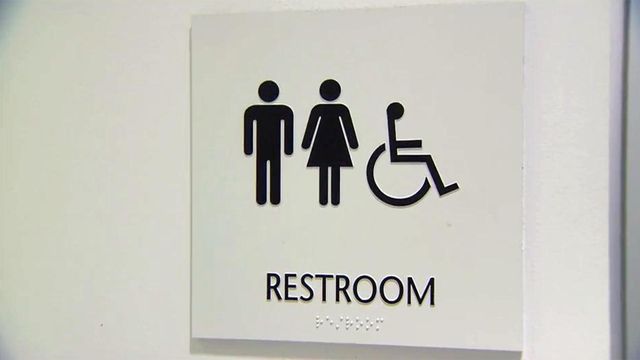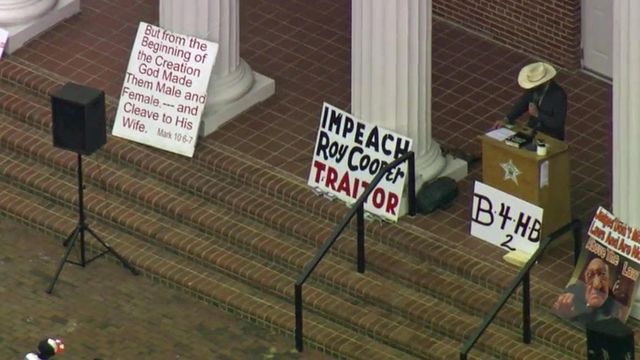States dig in against directive on transgender bathroom use
Politicians in Texas, Arkansas and elsewhere vowed defiance -- and other conservative states could follow suit -- after the Obama administration told public schools across the U.S. on Friday to let transgender students use the bathrooms and locker rooms that match their gender identity.
Posted — UpdatedThe federal government's guidance was met with tearful praise from parents of transgender students.
"It's heartbreaking that these kids are losing their lives because they can't be accepted," Hope Tyler, who has a transgender son at a Raleigh high school, said in reference to suicides among transgender people. "Somebody has to speak for the kids."
The directive from the U.S. Justice and Education Departments represents an escalation in the fast-moving dispute over what is becoming the civil rights issue of the day.
One by one, conservative political leaders thundered against it and President Barack Obama.
"This is the most outrageous example yet of the Obama administration forcing its liberal agenda on states that roundly reject it," said Mississippi Republican Gov. Phil Bryant.
The guidance was issued just days after the Justice Department and North Carolina sued each other a state law requiring transgender people to use the public bathroom that corresponds to the sex on their birth certificate. The law applies to schools and many other places.
While supporters say the measure is needed to protect women and children from sexual predators, the Justice Department and others argue the threat is practically nonexistent and the law discriminatory.
The guidance issued on Friday is not legally binding, since the question of whether federal civil rights law protects transgender people has not been definitively answered by the courts and may ultimately be decided by the Supreme Court.
But schools that refuse to comply could be hit with civil rights lawsuits from the government and could face a cutoff of federal aid to education.
Texas' lieutenant governor said the state is prepared to forfeit billions rather than let the Obama administration dictate restroom policy for its 5.2 million students.
"We will not be blackmailed by the president's 30 pieces of silver," Republican Lt. Gov. Dan Patrick said.
Rodney Cavness, superintendent of the Port Neches-Groves school district in Texas, told KFDM-TV, "When I get that letter, I'll throw it away."
Similarly, GOP Gov. Asa Hutchinson of Arkansas said schools should disregard the directive, which he derided as "social engineering."
North Carolina Lt. Gov. Dan Forest said the Obama administration is trying "to push his version of a social policy on our state with no Constitutional authority to do so," and he said schools statewide should adhere to House Bill 2, the state law that prompted the Justice Department lawsuit.
Governors and top leaders in other conservative states railed against the guidance but stopped short of telling schools to ignore it.
Kentucky Gov. Matt Bevin said: "It is difficult to imagine a more absurd federal overreach into a local issue."
However, Democratic Govs. Peter Shumlin of Vermont and Jay Inslee of Washington praised the Obama directive, saying it was consistent with their own policies.
"I applaud the Obama administration for establishing policies that will better provide all our children an opportunity to thrive," Inslee said.
NC schools caught in middle
North Carolina schools were trying to walk the line between complying with House Bill 2 and heeding the federal directive.
"It's a tricky place for us to be in," Durham Public Schools spokeswoman Chrissy Deal said. "We have to look at the directive and make sure we fully understand it."
State Sen. Mike Woodard, D-Durham, called House Bill 2 "monstrous," saying DPS could lose $96 million in federal funding if the government determines the district is violating the civil rights of transgender students and decides to withhold support for things such as school lunches and special education programs.
But Deal said DPS has long worked with transgender students to provide them with private or staff restrooms.
"For the time being, we will continue to treat our students the way we treat them now, which is with dignity and respect and compassion. HB2 didn't change that," she said.
The Wake County Public School System likewise "strives to provide a respectful, safe, and supportive environment for all students," spokeswoman Heather Lawing said in an email, adding that schools handle requests from transgender students on a case-by-case basis.
"News and developments about the topic of transgender students have changed almost weekly and sometimes even more frequently since March. Our attorneys are reviewing the most recent developments related to HB2 and federal guidance," Lawing said.
A spokeswoman for Johnston County Schools said her district will follow state law. Cumberland County Schools officials were unavailable for comment.
The North Carolina Department of Public Instruction provided little instruction, however, saying in a three-sentence statement that, "as always, we support the legal protections afforded to all public school students and the safety of each child."
The federal guidance may portend more court fights over transgender bathroom access.
Already, officials from North Carolina and seven other states – West Virginia, Arizona, Kansas, Nebraska, Texas, Utah and Maine – signed on to a brief in recent days asking a federal appeals court to re-hear a case in which it sided with a Virginia transgender student seeking to use the boys' bathroom.
A group of North Carolina students and parents sued the government on Tuesday, seeking a court ruling that transgender people aren't covered by sex discrimination provisions of Title IX and other federal laws and an order preventing federal education funds from being stripped from the state.
"They're using a new interpretation of Title IX that is completely unlawful, and it really compromises these students' privacies," said Kellie Fiedorek, legal counsel for Alliance Defending Freedom, which is representing the students and their families.
"At the end of the day, schools have a duty to protect the privacy and the feelings of all of their children," Fiedorek said. "What the Obama administration did this morning was basically tell these children that, 'We don’t care about your privacy. We don’t care about how you feel as a young girl going into the restroom where a biological male or boy might be.'"
Chris Brook, legal director for the North Carolina chapter of the American Civil Liberties Union, said the directive merely gives schools ideas on how to "make sure that all students, including transgender students, are safe at school."
The ACLU is representing six transgender people in a federal lawsuit challenging House Bill 2.
"It's very helpful in regards to providing that guidance to schools," Brook said.
The new guidance says public schools must treat transgender students in a way that matches their gender identity, even if their education records indicate a different sex.
Some school systems around the country already accommodate transgender students when it comes to bathroom use.
Nearly half the schools in the 53,000-student Seattle district have gender-neutral restrooms, and students can also use the bathrooms in the school nurse's office, spokeswoman Stacy Howard said.
The National School Boards Association has published guidelines for its members in dealing with transgender students. It stops short of telling them exactly what to do, instead advising them to work with their attorneys to determine the best course amid a "shifting legal landscape."
Francisco Negron, chief attorney for the organization, said there is a "disconnect" between what is happening in various states and what the federal government is demanding, "and school districts are caught in the middle."
Transgender students, parents applaud move
Tyler, whose 15-year-old transgender son attends the Raleigh high school, said she cried when she heard about the Obama administration directive.
"It means a lot to our kid. People don't realize that these kids in schools weren't having any bathroom issues before," she said.
Since the passage of House Bill 2, Tyler's son has been doing his schoolwork under a special arrangement that allows him to take classes mostly from home.
Durham School of the Arts student Cailin Clarke said she welcomes the federal directive.
"One of my best friends is trans, and he can't use the bathroom," Clarke said. "He has to walk across the school to use the bathroom where he's safe. and it's really alarming."
Before the law was passed in a one-day emergency legislative session in March, Hunter Schafer, 17, had no problems being accepted by her peers at the North Carolina School of the Arts, a residential high school in Winston-Salem where the Raleigh teen has lived in the girls' dormitory.
With the passage of the law, Schafer said she found herself "just having to decide, do I break the law, or do I put myself in this highly uncomfortable or highly dangerous situation in the men's restroom?"
Eventually, the school gave her her own private restroom.
"Putting me into that box of a grown man going into a women’s restroom is incorrect," said Schafer, one of six transgender people who have challenged House Bill 2 in federal court. "I have to kind of put myself in their shoes and try to understand where they’re coming from, and I truly think that’s a place of misunderstanding."
Her mother, Katy Schafer, said the argument used by House Bill 2 supporters that boys or men would be naked in front of girls is based on a false premise.
"(It's) starting from the assumption that she would want to undress in front of other people," Katy Schafer said. "They’re assuming this child doesn’t want to be private."
Her father, Mac Schafer, was elated to hear the new guidance from the Obama administration.
"As a parent, some of your core instincts are protection for your child," he said. "To know that the federal government is pushing for respect and safe space and rights for Hunter is thrilling."
Related Topics
• Credits
Copyright 2024 by WRAL.com and the Associated Press. All rights reserved. This material may not be published, broadcast, rewritten or redistributed.





